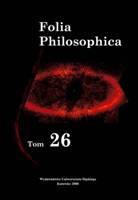Prawda jako idea regulatywna. Husserlowska fenomenologia wobec absolutyzmu i relatywizmu
Truth as a regulative idea. Husserl’s phenomenology towards absolutism and relativism
Author(s): Piotr ŁaciakSubject(s): Philosophy
Published by: Wydawnictwo Uniwersytetu Śląskiego
Keywords: truth; idea; phenomenology; absolutism; relativism; cognition
Summary/Abstract: In the article, Husserl’s phenomenology is presented a position being in between absolutism and relativism. According to absolutism, absolute truth is possible as a correlate of the adequacy of cognition. However, from the perspective of relativism, cognition is inadequate and, thus, absolute truth is unavailable. Husserl goes beyond the alternative of absolutism and relativism, maintaining the notion of an absolute truth as a regulative idea. Avoiding absolutism, phenomenology does not change into relativism because it treats the adequacy of cognition as a regulative idea which also leads to retaining the truth as an idea as such. In phenomenology, the truth must be understood in the perspective of the adequacy of obviousness and because such adequacy in cognition does not really happen, both the truth and adequacy shall be regarded as regulative ideas.
Journal: Folia Philosophica
- Issue Year: 2008
- Issue No: 26
- Page Range: 237-255
- Page Count: 19
- Language: Polish

